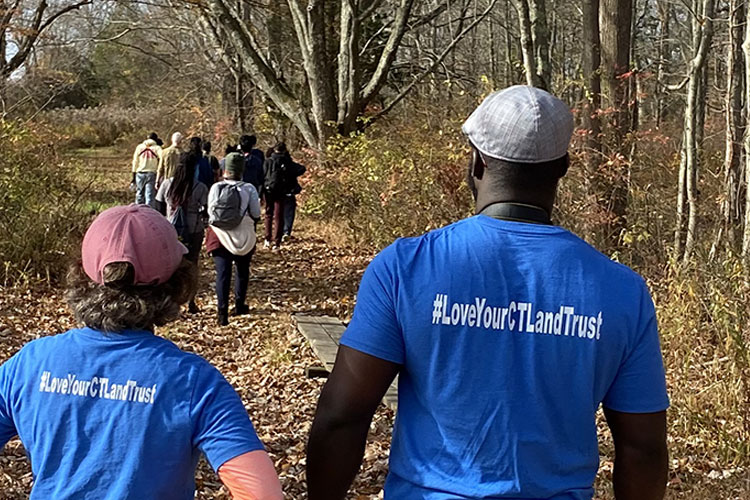News

Building upon CLCC’s previous work in New London County (NLC), the 2021-2022 NLC Advancement Initiative worked to address issues of diversity, equity, inclusion and justice (DEIJ) within the land conservation sector, and broaden land trust outreach to traditionally underserved, vulnerable, and BIPOC communities. This next phase of the NLC Advancement Initiative allowed CLCC and its 16 organizational participants to build upon insights gained in 2020-21 from several community groups in the New London area – including how they use and view conserved land and land trusts, and what elements of land conservation can be improved upon within their communities.
The overarching goal of the program was to address DEIJ issues by fostering greater awareness of community needs and issues and exploring opportunities to address those needs through partnerships between area land trusts and “non-traditional partners” – i.e. community groups that provide services involving public health, economic development – particularly housing, disabilities, food security, and others.
PARTICIPANTS
Land Trusts:
- Avalonia Land Conservancy
- Colchester Land Trust
- Groton Open Space Association
- Lyme Land Conservation Trust.
- Old Lyme Land Trust
- Salem Land Trust
- Waterford Land Trust
Community Groups:
- Connecticut Area Health Education Center
- Connecticut Sea Grant
- New London Trees
- Southeastern Connecticut Community Land Trust
- Southeastern Connecticut Council of Governments
- Step Up New London
- Town of Groton
- Town of Groton Conservation Commission
- Yale Center on Climate Change and Health
AN OPPORTUNITY FOR SELF REFLECTION
Guided by equity coaches Ashley Stewart and David Sutherland, CLCC worked with NLC land trusts to focus internally and view their own operations through a DEIJ lens. This internal organizational work helped to ensure cultural competency before engaging with community groups from different sectors. Participating land trusts addressed:
- Reimaging Conservation – The concept of being different and how each person may experience that concept;
- Difference Takes Many Forms – How participants and different cultural groups experience nature and how they are perceived when they are enjoying nature in their particular ways;
- Challenging Acceptable Uses of the Land – Expanding our concepts of how conservation land can be used and how it relates to development;
- Acknowledging Indigenous History – Very briefly, the history of theft and appropriation of lands previously inhabited by indigenous people;
- Trust and Skepticism – How trust and distrust are generated in communities over time and how they impact relationships between sectors; and
- Partnership and Compromise – The components of a good partnership and what new partnerships might these land trusts want to explore.
GAINING NEW PERSPECTIVE
Following these internal conversations with NLC land trusts, CLCC invited community groups to engage in conversations with the participating land trusts. Again guided by Ashley Stewart and David Sutherland, these joint sessions allowed land trusts and community groups to gain different perspectives and deeper understanding, especially as it pertains to:
- Organizational Perceptions – How did they see themselves, how are they seen by others, and how were these perceptions created;
- Defining Community – What are the elements of a thriving community;
- Community Challenges – What are the major challenges their community faces, how does their organization contribute to their community, and what obstacles do they face;
- Relationship to Land – How does their community use land; how else could their organization use land; who uses their land and who does not;
- Expectations of this program – How might they have changed in light of the dialogue sessions; and
- Defining Partnerships – What do they think are essential components of a good partnership and how do they navigate distrust?
NEW CONNECTIONS, NEW OPPORTUNITIES
Improved Awareness and Perspective: Multiple community groups agreed on the perception that land trusts can be elitist and it can be difficult to understand their intentions. This revelation can be challenging for the land trusts to hear, yet representatives of the land trusts listened with open minds and hearts and sought advice on how they can change this perception. It was inspiring to see the land trusts react in an understanding and respectful manner when confronted with expressions of distrust and disconnect from organizations that serve these communities. Moving forward, this heightened understanding will be the foundation for a productive and equitable partnership between these land trusts and community groups.
Increased Collaboration: The format of joint community conversation sessions fostered opportunities for collaboration between the community groups and land trusts – most of which had never met before joining this Advancement Initiative. The Advancement Initiative gave community organizations space to share the challenges they face in undertaking their mission and providing services to their community. The Advancement Initiative also offered local land trusts an effective and impactful opportunity to explore how they may serve more people in new ways. For example, the Salem Land Trust (SLT) expressed interest in collaborating with New London Trees and Step Up New London to lead an introductory walk for all age groups on a SLT preserve.
This Advancement Initiative has also helped CLCC to build relationships with and learn from NLC community organizations that will better inform the future of our programming to promote an inclusive and collaborative conservation community.
LESSONS LEARNED AND NEXT STEPS
This phase of the NLC Advancement Initiative was a pivotal next step in CLCC’s ongoing effort to build relationships and foster partnerships between land trusts and other community organizations. While longer-term community impacts are yet to be seen, we are confident that this grant enabled land trusts and community groups to establish the groundwork for collaborative and mutually beneficial relationships that will positively impact their respective service areas.
CLCC was heartened to see specific and tangible partnerships identified that would have a positive impact on the community. As previously mentioned, we plan to host a follow up session with the groups in six to eight months to gauge progress and further encourage communication and engagement between the groups.
With the implementation of each successive Advancement Initiative, CLCC continues to gain further insight into some of the obstacles impacting traditionally underserved, vulnerable, and BIPOC communities. While we, of course, gain knowledge through resources and workshop presentations, it is the conversations with and between the participants – always candid, at times uncomfortable, but always insightful – that continue to expand our understanding of the systemic barriers faced by the people we, and the land trusts with which we work, are seeking to reach, engage and serve.
ACKNOWLEDGEMENTS
CLCC is grateful to the Community Foundation for Eastern Connecticut for supporting this Advancement Initiative with a $25,000 grant, and for its foresight and patience in allowing CLCC to take our time in building trust among participants through successive phases of the NLC Advancement Initiative.
We also thank CLCC Board Member, Doris Johnson, who served as a project advisor and provided extraordinary support during all stages of the Advancement Initiative.
